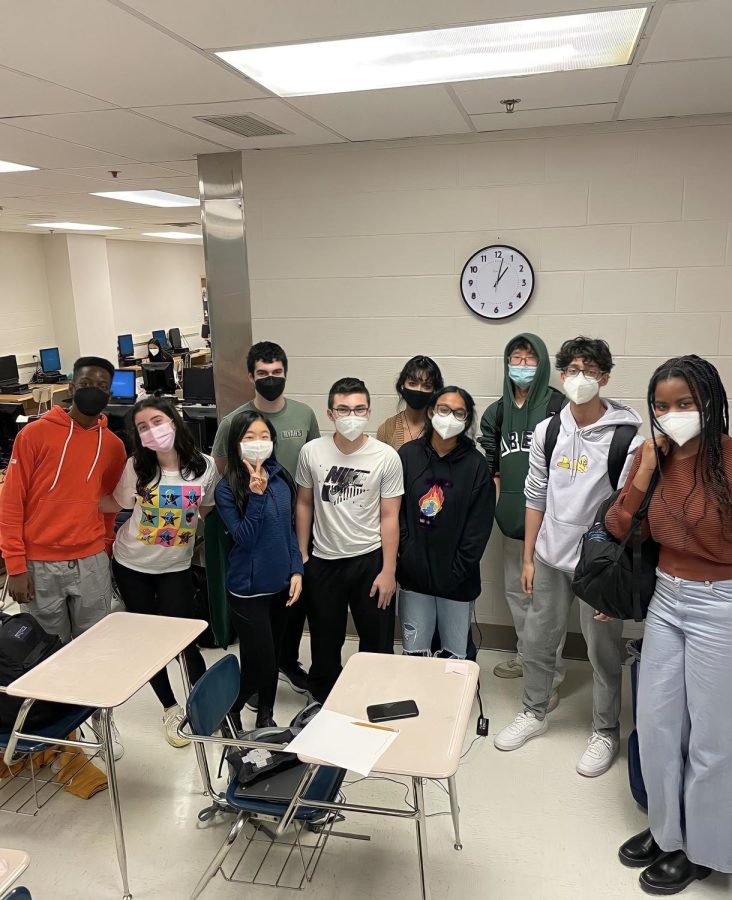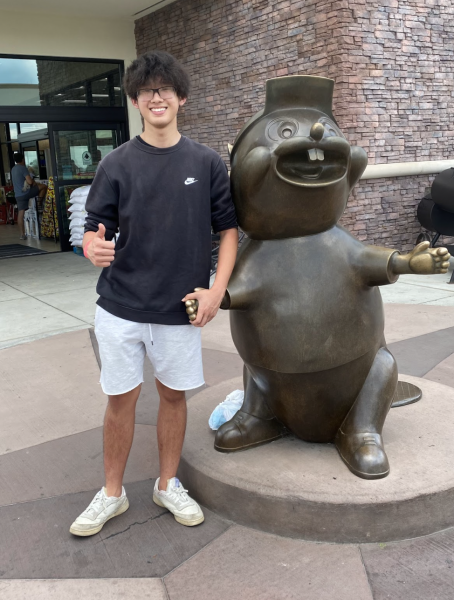Right or Wrong? Ethics Bowl addresses social dilemmas
Photo courtesy of Amanda Kossoff.
Members of the Winston Churchill Ethics Bowl pose for a picture after a team meeting on February 10th, 2022. From left to right: David Ameh, Amanda Kossoff, Jaehee Lee, Ryan Chernoff, Brady Cohen, Yasmine Abou Aly, George Chang, Antoine Martinez, and Isabella Ngwana.
March 15, 2022
An uproar of voices erupts as two groups of seven students discuss their stances on the ethics of ghosting. Regionals are in two days, which means it is time to get serious.
“Maybe we can bring up virtue ethics, or righteous indignation! Like, since Imani is being disrespected, it’s ethical for her to ghost the guys who treated her badly,” WCHS sophomore Jaehee Lee quips.
“But I feel like we need to consider intent—I don’t think it’s morally permissible to end a virtual relationship without any kind of notice. When somebody ghosts, there’s always potential to be malicious, which goes against deontological ethics,” WCHS junior Brady Cohen brings up.
The two go back and forth, but after a while, they come to a consensus. Amanda Kossoff, WCHS junior and the team captain, nods along and writes down notes.
“[The Churchill] Ethics Bowl in itself is a collaborative event where we discuss real life ethical issues and analyze ethical dilemmas,” Kossoff said. “There are 15 cases, and during regionals, a moderator randomly chooses one for us to present about. We meet every Tuesday and my favorite part is that after our bell rings, we’re still talking about the case out of the classroom. It shows that people are involved and that people care—it’s not just an extracurricular for college apps.”
Philosophy, especially in the high school curriculum, is often overlooked and neglected in favor of other disciplines. Blogger Shawn Adler said philosophy is the least likely subject taught in American schools. As a result, Kossoff’s introduction to the field was quite unexpected.
“It all started when I was taking a course over the summer. When I realized that it was an ‘Ethics in Genetics’ course, I was really upset,” Kosoff said. “My roommate was in a molecular bio lab I wanted to be in, and from the beginning, I didn’t think I would enjoy the ethics course because I was a science girl. But throughout the course, I came to understand that there’s so many nuances in philosophy and it requires a lot of critical thinking to study it.”
After realizing that there were not any clubs dedicated to philosophy or ethics at WCHS, Kossoff took the initiative to create one, the Philosophy and Ethics Club, with the intent to build a community of people who were passionate about this field. However, big responsibilities come with being the founder.
“In the Ethics Bowl, which is a subset of [the Philosophy and Ethics Club], you’re only allowed to send teams of seven at regionals,” Kossoff said. “We had so much interest, which we were not expecting, and it was disappointing that I had to [cut people] because I think that everybody deserves to be able to speak about ethical issues and analyze these important cases for our generation. But, I felt proud that I got to craft the best teams and accept people who care and will work hard about ethics.”
For WCHS sophomore Vasu Betapudi, participating in Ethics Bowl has allowed her to find a community where she could freely express her thoughts on important societal issues.
“I signed up for Philosophy and Ethics Club freshman year when I was looking for clubs because I had just moved from Ohio and I was new to the entire district,” Betapudi said. “I wanted to sign up for clubs, and Philosophy and Ethics looked especially interesting to me. I love how it’s a conversation for students to contribute ideas to the ethics of certain situations that apply to real life, whether or not they’re actual situations or just hypothetical.”
Kossoff’s main goal was to differentiate her club from other academic clubs at WCHS, which can be competitive or have toxic atmospheres.
“I wanted [Ethics Bowl] to be more of a community,” Kossoff said. “With these cases, they’re super controversial topics and people often have disagreements. All our members have different perspectives and backgrounds and values, but I love how we’re comfortable enough to be able to understand each other and see where we’re coming from.”
With such a wide variety of ethical dilemmas to discuss, there are certain cases that stand out over others.
“My favorite is the ethics of [not responding to text messages] because we don’t think of that at all, and I guess I’m a pretty big perpetrator of that,” Betapudi said. “I’m a bit bad at replying to people, so it was cool to do a little self-reflection and self-growth when considering the morality of it all.”
Although Ethics Bowl is still relatively new, plans for the future of the club are already underway.
“I’m so proud that even though we started new, we’re already making these amazing and complex arguments—but there’s obviously still room for growth,” Kossoff says. “I want to incorporate leadership positions, such as captains, coaches, a student that mentors new people who want to join, etc. I have so many ideas for next year, and it’s only going to get better.”



